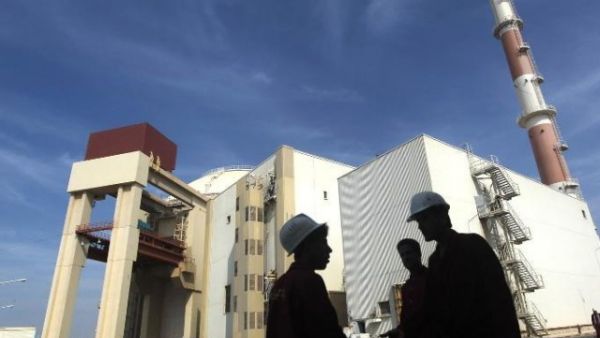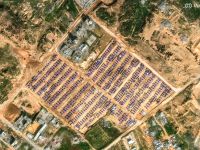US Secretary of State John Kerry and Iran's Foreign Minister Mohammed Jawad Zarif held intensive talks on Tehran's nuclear program on Wednesday, returning for an evening session before handing off to their deputies, officials said.
Kerry and Zarif "had substantive meetings for approximately five hours today and they discussed a broad range of issues with a small group of staff from each side," a senior State Department official said.
But Kerry later unexpectedly returned to the Geneva lakeside hotel for a third meeting lasting some 90 minutes with Zarif after briefing senior US negotiators ahead of their technical-level talks scheduled with Iranian counterparts for Thursday in the Swiss city.
"Secretary Kerry and Foreign Minister Zarif reconvened this evening to continue discussion about the nuclear negotiations in advance of the start of the next round of talks tomorrow," a US State Department spokeswoman said.
Wendy Sherman, acting deputy secretary of state, and Deputy Foreign Minister Abbas Araqchi are to lead their delegations at Thursday's talks, to be followed on Sunday January 18 by wider talks between Iran and major six world powers — known as p 5+1.
Iran and six world powers renewed their quest for an elusive nuclear deal after negotiators failed for the second time in November to reach to a “comprehensive agreement” before a self-imposed deadline. The two parties extended the deadline until the end of June to reach a deal.
The West suspects Tehran may be trying to develop a nuclear weapon capability. Iran denies the allegations and has stressed time and again that its nuclear program is solely aimed at producing atomic energy to reduce the country's reliance on fossil fuels.
Before the Wednesday’s meeting Zarif told reporters he felt the talks were "important."
"I think it will show the readiness of the two parties to move forward to speed up the process," he said.
But asked if there would be a comprehensive deal by the new deadline, he remained cautious, replying: "We'll see."
Past negotiations have stumbled over Iran's insistence that it retain the right to enrich some uranium — which can in some cases be used to make an atomic bomb — for what it says is a peaceful civilian nuclear program.
There has also been disagreement over global sanctions, with Tehran calling for an end to the crippling regime while the US has insisted on a temporary, gradual suspension.
"All issues are hard until we resolve them and all issues are easy if you resolve them," Zarif told reporters earlier on Wednesday.
The new Republican-controlled US Congress is already considering a bill which would slap new sanctions on Iran despite attempts by the Obama administration to hold them off.
Zarif set to meet German Foreign Minister Frank-Walter Steinmeier in Berlin Thursday and his French counterpart Laurent Fabius in Paris Friday. Kerry will also be in Paris on Friday, but it was unclear if he would meet again with Zarif.
Zarif told Iranian television earlier that "we have arrived at the stage where the other party must take decisions so we can go forward."
"New proposals must be put forward. We are ready to discuss all the issues, but we will have to see if the other side is ready," he said.
Elsewhere, in Tehran on Wednesday Marziyeh Afkham, Iran’s foreign ministry spokeswoman, stressed that Iran is closely watching the nuclear talks and will make “new decisions” if it reaches the conclusion that the talks are not moving in the right direction or leading to a “comprehensive, fair and reasonable agreement,” which includes Iran’s demands.
According to IRNA, Iran’s official news agency, Afkham said that using sanctions to pressure Iran “would be a mistake.”
Diplomats on both sides say that despite progress in previous rounds of talks, the two sides remain far apart on crucial points: the number and type of uranium-enriching centrifuges Iran should be allowed to keep spinning and the process for relieving sanctions and the duration of the final deal.
Tehran wants to massively ramp up the number of enrichment centrifuges in order, it says, to make fuel for a fleet of power reactors that is yet to be built.
The West seeks them dramatically reduced, a move which, together with more stringent UN inspections and an export of Iran's uranium stocks, would make any attempt to make the bomb all but impossible.
Moreover, Iran wants a quick and total lifting of UN and Western sanctions that have strangled its economy, including its vital oil trade, but the powers want to stagger any relief over a long period to ensure Tehran complies with any deal.








